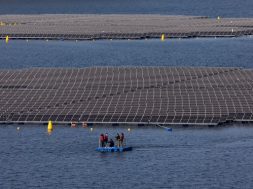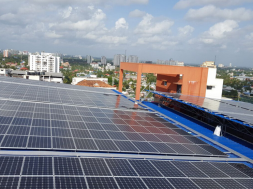
The centre is working on a plan for making domestic manufacture of solar power equipment and modules competitive vis-à-vis imports from other countries such as China.
Currently, most of the solar power developers in India source solar modules and equipment from China as they are cheaper.
In order to promote domestic manufacture of solar power equipment, the National Democratic Alliance government plans to come out with a supporting policy for manufacturing the entire range of solar power generation equipment in the country.
Union minister for power, coal, mines and new and renewable energy, Piyush Goel, stated this at a media briefing after a meeting of the Cabinet Committee on Economic Affairs (CCEA) on Wednesday.
The move comes at a time when the government has proposed a doubling of the solar power generation target from 20 GW to 40 GW.
The country has also seen record low-priced bids (at Rs2.97 per kilowatt-hour) at the auction of solar power park in Rewa in Madhya Pradesh.
India’s plans to source domestically manufactured solar panels and modules, however, has been handicapped by a ruling by the World Trade Organisation’s (WTO) appellate body, the highest court for resolving trade disputes, striking down India’s local content requirements for solar cells and modules last year.
The US had challenged India’s solar panel procurement policies at the WTO claiming that it discriminated against foreign manufacturers (See: India loses appeal against WTO solar panel ruling). Currently, most of the solar power developers in India have been sourcing solar modules and equipment from countries such as China as they are cheaper.
India, the world’s third-largest energy consumer after the US and China, plans to achieve 100 GW of renewable power generation capacity by 2022 as part of its global climate change commitments.
A meeting of the Cabinet Committee on Economic Affairs (CCEA) on Wednesday also cleared the proposal to double India’s solar park capacity to 40,000 mega Watt.
Solar power tariffs have fallen to levels around Rs4.34 per kWh in the current financial year from around Rs10.95-12.76 per kWh in 2011, with the cost of equipment taking a nosedive.















